Halifax County, N.C. — It was the first railroad hub of the South. It's a place where the first action was taken in 1776 declaring independence from Great Britain. Halifax County holds a place in American history, which includes the lives of freed and enslaved Black people.
Three locations within the county are designated sites for the National Park Service's Network to Freedom: the old town of Halifax called Historic Halifax, the Roanoke River and the Roanoke Canal. The three sites were a part of the Underground Railroad Network to Freedom.
Through research in 2013, historian Rodney Pierce says he is one who made the connection to identify the Roanoke Canal as part of the journey.
Uncovering Black History
Pierce, from Halifax County, is dedicated to uncovering the untold history in his community. During the bulk of Pierce's research, he was the cultural resource leader at the Roanoke Canal Museum and Trail.
"We knew that the Underground Railroad ran through the Town of Halifax, and we knew that it ran through the Roanoke River," said Pierce. "And so knowing that the batteaux (or boats) were driven by enslaved Black men who sometimes did not have white survivors, I hypothesized - these guys probably used these barrels that we were carrying salt and other goods in to sneak enslaved people to freedom."
Though uncovering history and his research, Pierce says he got the calling to become a teacher in his community.
"I also knew that if I wasn't taught what I learned while I was working here, then they probably weren't being taught that either," said Pierce. "So, they needed to know it."
Pierce says he wants to educate students on the full picture of the town's history so they know the role their ancestors played.
Confederate at Center
Beyond history, Pierce's activism in the community continues present day. Historic Weldon, also in Halifax County, was a bustling center of activity during the Civil War with several Confederate training camps in the area.
One Confederate statue still remains, in what is now a predominately Black neighborhood in Weldon. Pierce and neighbors are working to get the statue relocated to Historic Halifax.
Angela Person, who is from Halifax County, still has family in the area and says she wants the statue to come down soon.
"Children are out and riding their bikes and trying to enjoy life as young Black children, and then they have this statue standing over them with a gun in his hands. And I would be threatened," said Person. "I would go home and ask questions. 'Why is there a man with gun standing, hovering over me?'"
Weldon's town administrator says he put together a relocation presentation on the statue and presented it to the Weldon Board of Commissioners. In over a year, the commissioners have not taken any action.
A separate stone that sat out front of the county courthouse, which honored a Confederate general, has since been removed.
The Cemetery
Learning the history of Halifax County means looking into one’s own family lineage. Pierce says he has always wanted to learn about his ancestors, but looking into the town's past was more natural for him.
One of his mentors and lifelong friends, Dr. Terence Wyche, is a genealogist who put in the work to find out his own family story. Wyche says for years he would spend time in the family records section of the Halifax County Library, looking for anything he could find on his ancestors, the Hawkins family.
Aside from the library, he would visit a cemetery. It’s where some of his ancestors are buried, and he knows their stories.
“Reverend Captain Hawkins was not a slave, but his father was a slave. His name was Robert Hawkins, and he is listed in the slave register,” said Wyche. “Next to this is his mother-in-law, Lizzie Diggs Hicks, as well as his wife Sallie Diggs Hawkins."
He says this cemetery is where they believe Sary was buried. According to Wyche’s research, she is the first recorded Black Hawkins to come to Halifax County. Wyche says she was born around 1780 and, based on records he has uncovered, she is the start of 95% of the Black Hawkins family.
She is Wyche’s fifth-great grandmother, and Pierce’s sixth-great grandmother.
Wyche says while tending the cemetery one day, he got the call to look more into the stories of his family.
"I looked back, I head an inaudible voice - just in my mind it said 'tell our story,'” said Wyche. “And I sought to just make them come alive."
Connecting the Dots
Dr. Terence Wyche says many of his weekends in the '90s were dedicated to going to the Halifax County Library. He would go through the Bible records and the family records on file to find any information his could about his ancestors – the Hawkins family.
He says his mom and grandparents are the people who got him interested in his ancestry.
“There was no ancestry.com, so you had to go through the files,” said Wyche. “Open up these old documents and dust and everything just falling, you had no choice but to do it.”
It’s a time consuming process, but for Wyche it was worth it.
“It was just so rewarding to just be able to just see that these names that you heard so much about, they began to become alive,” said Wyche.
Through his research he has put together two books on his family history. It includes hundreds of family members and copies of slave registries. He has information on how much money an enslaved person in his family was valued for by their slave owners.
His book includes information on the slave owners too – James Maddison Hawkins, and his family.
Reconnecting a Family
Dr. Wyche’s research means being able to connect with family members he never knew he before. He says at the first family reunion in 1995 close to 1,200 of Sary’s descendants were there. Sary is the first recorded Black Hawkins that Wyche has been able to find, born around 1780.
“We thought that was remarkable,” said Wyche.
He says no matter if they were first cousins on 20th cousins, the family embraced each other.
Plenty of the family had not met each other before, or if they had met they didn’t know they were related. What they did share was similar stories.
“We couldn’t date, we couldn’t go traveling. We couldn’t go to a ball game with people,” said a cousin remembering how it was growing up in Halifax County. “Until my mom and dad approved of it. I thought they were just being over protective, but come to find out they were just looking out to make sure we weren’t dating our cousin.”
It’s stories they laugh about now, knowing their family connections.










